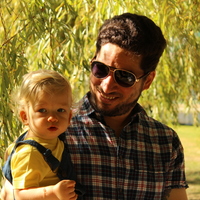Angelo G Mongiovi
University of Aveiro, Communication and Art (DeCA), Undergraduate
- Guitarrista, compositor, pesquisador e produtor, ficou conhecido pela versatilidade dos trabalhos realizados no mundo da música. Da docência à investigação, da composição à produção, da guitarra ao violão, percorreu do rock à MPB, do samba ao Jazz. Agora, da academia à espiritualidade.edit
This work presents an investigation in jazz area about the solo performance played in electric guitar, more popularly known as chord-melody. Are here brief historical data, a summary of the main musical techniques used in this... more
This work presents an investigation in jazz area about the solo performance played in electric guitar, more popularly known as chord-melody. Are here brief historical data, a summary of the main musical techniques used in this performative style and arrangements composed by me based on this musical language, both in score as on DVD.
Research Interests:
Research Interests:
This work presents an investigation in jazz area about the solo performance played in electric guitar, more popularly known as chord-melody. Are here brief historical data, a summary of the main musical techniques used in this... more
This work presents an investigation in jazz area about the solo performance played in electric guitar, more popularly known as chord-melody. Are here brief historical data, a summary of the main musical techniques used in this performative style and arrangements composed by me based on this musical language, both in score as on DVD.
Research Interests:
This study presents a brief analytical description of the production process, recording and sound result of jazzy theme entitled Baião D'Aveiro. This musical composition by my own its part of my jazz album (Dom Angelo - Porto, 2015,... more
This study presents a brief analytical description of the production process, recording and sound result of jazzy theme entitled Baião D'Aveiro. This musical composition by my own its part of my jazz album (Dom Angelo - Porto, 2015, Figure 1 and 2) that will be analyzed in theoretical foundations as one of the portions of my doctoral thesis. My research seeks to understand and elucidate the musical, social and historical characteristics of the genre known as Brazilian Jazz. As the main analysis tool, I am seeking to illustrate the process of musical rhetoric, using the "Topical Theory" applied to
Brazilian music, work begun by Piedade (1997, 2003, 2005, 2007, 2011 and 2013). The word "transnationalism" is used in this poster as a way to metaphorize the internationalization of Brazilian music and its ownership by jazz musicians from Portugal, with attention to the music genre which refers to a regional and deep Brazil, Baião. The process of artistic understanding and easiness performance of the Portuguese musicians related to this musical genre, reveals the main diagnosis of this academic publication.
Brazilian music, work begun by Piedade (1997, 2003, 2005, 2007, 2011 and 2013). The word "transnationalism" is used in this poster as a way to metaphorize the internationalization of Brazilian music and its ownership by jazz musicians from Portugal, with attention to the music genre which refers to a regional and deep Brazil, Baião. The process of artistic understanding and easiness performance of the Portuguese musicians related to this musical genre, reveals the main diagnosis of this academic publication.
